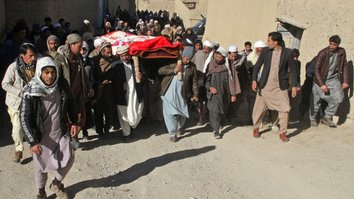KANDAHAR -- A high-profile Afghan television journalist was fatally shot in Kandahar city on Thursday (May 6), officials said, a day after the Taliban warned against "biased reporting" by the media.
Nemat Rawan was until last month a popular talk show host with the country's leading broadcaster, TOLOnews, before joining the Ministry of Finance as a communications specialist.
He was "assassinated by unknown gunmen", Kandahar city police spokesman Jamal Naser Barekzai said.
"Heartbreaking to hear that a friend and former colleague Nemat Rawan was shot dead in Kandahar city today," Lotfullah Najafizada, head of TOLOnews TV, said in a post on the social media platform Twitter.
Nobody claimed responsibility for the slaying, but the Taliban have been blamed for a wave of assassinations of journalists in recent months.
On Wednesday, a Taliban spokesman warned that media workers who carry out "biased reporting" would be "held responsible".
Abdullah Abdullah, chairman of the country's peace council, on Thursday condemned the Taliban's threat against the media and "any attempts to silence Afghan journalists".
Members of Afghanistan's educated class -- including journalists, activists and judges -- have been the target of bombings and shootings for months, forcing many to go into hiding or leave the country.
The killings have escalated since peace talks began last year between the Afghan government and the Taliban, sparking fears that the insurgents are eliminating perceived opponents as negotiations stall.
At least 11 Afghan journalists were killed in 2020, with four more reportedly murdered this year, according to a list compiled by Amnesty International.
In early March, three female media workers were gunned down in Jalalabad.
About 1,000 Afghan media workers have left their jobs in the past six months, an Afghan journalists' safety committee said recently.
Afghanistan has long been ranked as one of the most dangerous countries in the world for journalists.
Silencing journalists
In an April 1 report, Human Rights Watch accused the Taliban of targeting and killing journalists.
"A wave of threats and killings has sent a chilling message to the Afghan media at a precarious moment as Afghans on all sides get set to negotiate free speech protections in a future Afghanistan," said Patricia Gossman, associate Asia director, in the report.
"By silencing critics through threats and violence, the Taliban have undermined hopes for preserving an open society in Afghanistan," she said.
In addition to outright attacks, the Taliban have engaged in a pattern of threats, intimidation and violence against members of the media in areas where the Taliban have significant influence, as well as in Kabul, according to HRW.
"Those making the threats often have an intimate knowledge of a journalist's work, family and movements, and use this information to either compel them to self-censor, leave their work altogether, or face violent consequences," the report said.
In some cases, Taliban forces detained journalists for a few hours or overnight.
"The Taliban have recently intensified attacks on journalists, media workers and freedom of expression activists in order to silence the voice of freedom of expression and so that the media cannot cover crimes committed by the group," Ministry of Interior Affairs deputy spokesman Hamid Roshan said in April.
"The Taliban are responsible for all the crimes and attacks in which journalists, media workers and human rights and women's rights activists have been killed, and we have enough evidence in this regard," Roshan said.
"Journalists, media and freedom of expression have many enemies, and one of these enemies are the Taliban, who want Afghanistan to go back 20 years," Nazari Paryani, editor-in-chief of Mandegar newspaper, said in April.
"For this reason, they target journalists and civil rights activists so no one can criticise them in case of their potential return to power," Paryani said.
"The media, journalists and civil society activists are the ones who are changing society," he added. "By targeting them, the militants are trying to create an atmosphere of fear and terror."

![Nemat Rawan, a former talk show host with TOLOnews, was killed May 6 in Kandahar city, a day after the Taliban issued a warning to media workers. [Social media]](/cnmi_st/images/2021/05/06/29745-Journalist-Nemat-Rawan-585_329.jpg)







One of the most unpleasant and heartbreaking news of this week was the assassination of Nematullah Rawan, one of the most successful Afghan journalists who was brutally martyred. Assassination of this young man is a warning to other journalists and members of the media.
Reply2 Comment
Afghanistan is considered a big hell for the journalists of this country. Over the past one year, we've been losing one or two of our prominent journalists on monthly basis. Nematullah Rawan was one of the intelligent cadres of the country who was martyred in a very coward manner. He made himself famous in the shortest time and at his youngest age and had a place in the hearts of all Afghans. People all over the country knew him. He was presenting the news in his beautiful Kandahari dialect on Tolonews. I ask paradise from God to this unfortunate young man and I offer my condolences to his family and all the members of the media family. We are from God and to Him we shall return.
Reply2 Comment